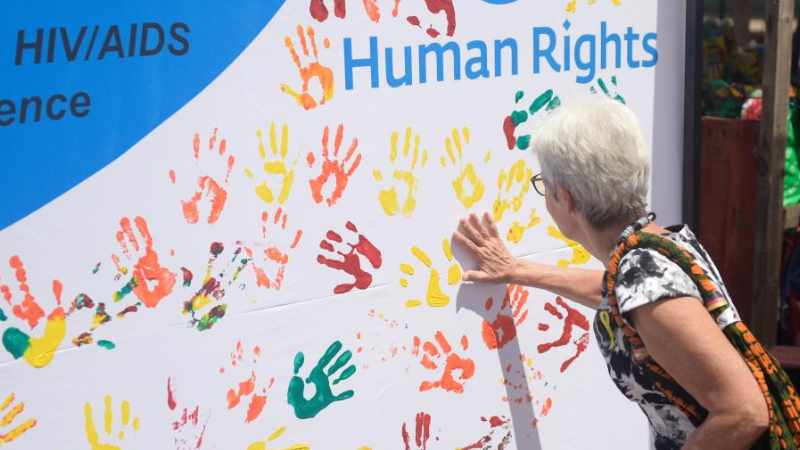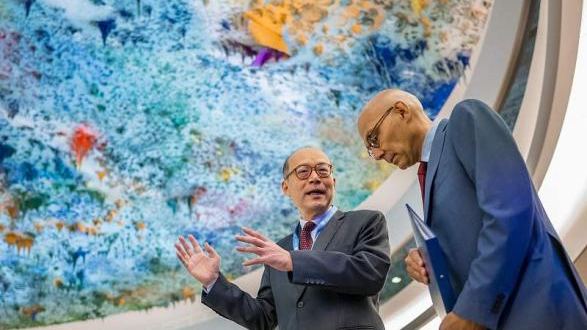
A woman applies paint to a banner during a public event to commemorate the Human Rights Day in Gaborone, Botswana, December 9, 2022. /Xinhua
A woman applies paint to a banner during a public event to commemorate the Human Rights Day in Gaborone, Botswana, December 9, 2022. /Xinhua
Editor's note: He Zhigao, a special commentator for CGTN, is an associate professor at the Institute of European Studies and a research fellow of the National Institute for Global Strategy of the Chinese Academy of Social Sciences. The article reflects the author's opinions and not necessarily the views of CGTN.
The China-Europe Seminar on Human Rights is being held in Italy on September 20-21. The seminar, which was initiated in 2015, is an institutionalized academic platform for communication and cooperation between China and Europe on human rights issues. This year, the seminar, themed "Modernization and Diversity in Human Rights Culture," will be a constructive and positive way to promote and protect human rights via equal and inclusive communication and cooperation.
The process of modernization is a process of advancement in human rights, which contributes to promote all-round development of those rights. It manifests that human rights should be defined in a more comprehensive manner, involving different components. The concept of human rights under Western discourse has great practical and historical limitations, and Western countries often use the concept of human rights and corresponding norms to create rules of the game, not only for their people to accept, but also for other countries to follow the narrow Western view of human rights. This is not to mention that there are various problems in the construction of human rights in Western countries themselves.
There is no one-size-fits-all model for human rights development, but the ultimate goal is to respect and protect basic rights in a holistic manner. Economic well-being is the fundamental dimension of human rights; socioeconomic development and human rights practices are mutually reinforcing. As far as the concept of human rights is concerned, it is a complex concept involving many aspects such as politics, economy, society and history. For China, "the biggest right is the happiness of the 1.4 billion Chinese people," including ending absolute poverty, building a moderately prosperous society in all respects across the country, the improvement of education, social security, developing the whole-process people's democracy, and advocating common values of humanity. New development philosophy and paradigm in China is the backbone of promoting common prosperity for all. Now, China is creating a new type of culture that fits within Chinese modernization, which represents a new form of human civilization.

UN High Commissioner for Human Rights Volker Turk (R) listens to Ambassador Chen Xu (L), Permanent Representative of China to the UN Office at Geneva and other International Organizations in Switzerland, prior to the opening of the 54th UN Human Rights Council in Geneva, September 11, 2023. /CFP
UN High Commissioner for Human Rights Volker Turk (R) listens to Ambassador Chen Xu (L), Permanent Representative of China to the UN Office at Geneva and other International Organizations in Switzerland, prior to the opening of the 54th UN Human Rights Council in Geneva, September 11, 2023. /CFP
There are differences and similarities in the political systems, history, culture and development paths between China and Western countries, and both sides should develop bilateral relations in a harmonious manner. For a long period, the EU has played an important role in promoting human rights via several instruments such as financial cooperation and development aid. Coupled with the all-round pressure exerted by the U.S., Europe has been "stimulated" by the strategic competition between China and the U.S. and forced to enter an active "reaction" period. If the EU uses human rights foreign policy as a tool for finger-pointing and even intervening in China, the "fishbone" in China-EU relations will hinder the further development of China-EU political relations. The frictions and conflicts between China and Europe will ultimately harm the interests of the people on both sides and the stability of the global order.
Historical experience tells us that those who try to impose their will on other countries will eventually find themselves in trouble and be condemned by the people of the world. The best strategy for dealing with double standards and doubts is to speak with facts. More obviously, China and Europe differ in history, culture, development level and ideology, which means we need more communication and coordination in a constructive and mutually respectful way.
China and the EU are two major forces upholding world peace, two big markets promoting shared development, and two great civilizations promoting human progress. Chinese modernization and European integration are the choices that China and Europe have made in light of their vision of the future. In pursuit of Chinese modernization, the EU is an important partner. The EU-China Human Rights Dialogue mechanism is a key channel of communication on human rights issues for China and the EU, and a key component of the China-EU comprehensive strategic partnership. It is true that conducting constructive communication on human rights on the basis of equality and mutual respect plays a positive role in promoting China-EU relations and common progress on human rights. Meanwhile, the European side should view China's human rights in an objective and fair manner and refrain from interfering in China's internal affairs and judicial sovereignty in the name of human rights. If the EU has sincere dialogue with China on human rights issues, instead of politicization, weaponization and instrumentalizing human rights to harass China, it will promote the well-being of the people of China and Europe.
Respecting differences while seeking common grounds is the right choice for the peaceful co-existence of all civilizations, especially for China and Europe. Dialogue on human rights between China and the EU will promote common sense and mutual trust, and is also a constructive way to solve the global challenges faced by mankind and the uncertainty of the international society. Therefore, China and the EU should work together via human rights dialogue, to preserve the political foundation of China-EU relations, enrich the content of human rights civilizations, enhance global human rights governance, improve international fairness and justice, and make greater contributions to world peace, prosperity and stability.
(If you want to contribute and have specific expertise, please contact us at opinions@cgtn.com. Follow @thouse_opinions on Twitter to discover the latest commentaries in the CGTN Opinion Section.)